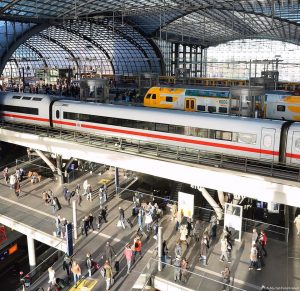 In 2019, 151 million passengers choose Deutsche Bahn ICE and IC services, with 2.8 million additional passengers representing an increase of 1.9%, compared to the previous year. 2019 was the fifth consecutive year in which patronage increased.
In 2019, 151 million passengers choose Deutsche Bahn ICE and IC services, with 2.8 million additional passengers representing an increase of 1.9%, compared to the previous year. 2019 was the fifth consecutive year in which patronage increased.
In addition to long distance rail patronage, regional rail services in Germany also rose by 1.6%, reaching 2 billion. “We are seeing clear signs of a modal shift towards rail, an environmentally friendly mode of transport,” DB CEO Richard Lutz said.
Total rail passenger transport volume rose by 695 million passenger-km year on year, to a total of 98.4 billion. DB Regio increased its net order book again for the first time in 2019, winning more train kilometers for future service than it lost to competitors.
Volume produced on the rail network increased again in 2019, with demand up 0.4% to 1.09 billion train path kilometres. The percentage attributable to non-DB operators rose to 33.8%, compared to 2018 (32.2%).
On freight segment, DB Cargo’s transport volume fell by 3.7% year on year. Because demand in cyclical sectors such as steel and automotive is declining, it is likely that sustained growth in rail freight transport will still take some time despite all efforts.
With an EBIT of EUR 538 million, DB Schenker achieved record results in 2019 for the third year in a row. With the exception of air freight, which saw declines throughout the industry, all business sectors showed improved figures last year. DB Arriva, DB’s European local transport subsidiary, faced a highly competitive environment in 2019, with EBIT falling slightly year on year.
The DB Group’s adjusted revenues rose to EUR 44.4 billion in 2019, an increase of just under 1%. DB expanded the largest investment programme in its history, investing substantially in the rail network, stations and trains. Adjusted earnings before interest and taxes (EBIT) fell by 13% year on year to EUR 1.8 billion as a result of this high level of investment in the future of rail.
“DB’s aim is to substantially increase the performance of rail in Germany. Investment in the future of rail will take priority in the coming years, which will be visible in our bottom line in the medium term,” said Richard Lutz.
Net capital expenditure increased by 41% year on year to EUR 5.6 billion. Gross capital expenditure also rose, with a focus on infrastructure. As before, the lion’s share of the funds will be used to expand and modernise the German rail system, boosting quality and reliability and adding new trains and additional staff.
At EUR 24.2 billion, net financial debt was slightly better than expected and remained below the debt limit agreed with the German government.
Share on:



